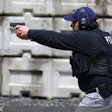In "Your Subconscious Mind," we talked about the roles and responsibilities of the conscious and subconscious mind and the importance of programming the subconscious for success. In the next few posts, we will examine the power of words and their role in programming the subconscious.
It's crucial for law enforcement officers to understand the power of words. It is not just semantics. It is often the difference between programming your subconscious for success or for failure. In some cases, it can be the difference between life and death.
Imagine yourself in a violent confrontation with a person who is intent on killing you. Do you want to survive, or do you want to win? Every officer I have asked this question to has said that they want to win. Why? Because there is a different image that comes to mind when you imagine winning and when you imagine surviving. Surviving for many people is defensive in nature. Winning brings to mind images of being offensive in nature, taking the attack to the subject and prevailing in the confrontation.
Words have power because they create images in our mind. Those images trigger emotions, which in turn affect our physiology. Now ask yourself. Are you training to win, or to survive? Are you talking about winning in training or are you still talking about survival? Are you focused on officer survival, or are you focused on officer safety with an emphasis on winning?
Some of you right now are reading this and saying 'bullshit' — they're just words, and they mean the same thing. After training law enforcement officers for the past 20 years, I can guarantee you that the two words do not mean the same thing. In fact, go back to the start of this blog entry. When I asked whether you would rather survive or win, did you respond, "It doesn't matter. They're the same thing." Or did you answer, "I want to win."
The point to remember is this. If you can make a simple, but powerful change to our language to ensure a greater likelihood that you will perform at the highest levels then you have no excuse not to make the change. You owe it to ourselves, our families, our peers and their families, our friends, our families and our citizens to change our language. You owe it to all these people because those are the people you are entrusted to protect.
Still not convinced? Answer this question honestly, "If the person you love the most in this world is attacked by a violent criminal, and you had a choice in how the event unfolded, would you rather they survived or would you rather that the person you love the most in this world won that violent confrontation?"
If you said that you would rather they win, then please change your language and talk about, imagine and train to win. If you said it doesn't matter, then please give serious consideration to choosing a new profession.
Editor's Note: Brian Willis is the deputy executive director of the International Law Enforcement Educators and Trainers Association (ILEETA). Contact him via his website Winning Mind Training.

















